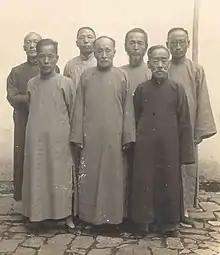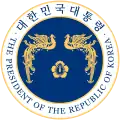Yi Dong-nyeong
Yi Dongnyeong (also spelled Yi Dong-nyung) was a Korean independence activist. He served as the fourth (1926), seventh (1927–1930), eighth (1930–1933), tenth (1935–1939), and eleventh (1939–1940) President of the Provisional Government of the Republic of Korea in exile in Shanghai, China.
Yi Dongnyeong 이동녕 李東寧 | |
|---|---|
 Yi Dong-nyeong in the centre | |
| 5th President of the Provisional Government of the Republic of Korea | |
| In office April 29, 1926 – May 3, 1926 | |
| Preceded by | Yang Gi-tak |
| Succeeded by | Ahn Changho |
| 7th President of the Provisional Government of the Republic of Korea | |
| In office May 16,1926 – July 7,1926 | |
| Preceded by | Ahn Changho |
| Succeeded by | Hong Jin |
| 10th President of the Provisional Government of the Republic of Korea | |
| In office August, 1927 – June 24,1933 | |
| Preceded by | Kim Gu |
| Succeeded by | Song Byeong-jo |
| 12th President of the Provisional Government of the Republic of Korea | |
| In office October,1933 – March 13, 1940 | |
| Preceded by | Song Byeong-jo |
| Succeeded by | Kim Gu |
| Personal details | |
| Born | October 6, 1869 Cheonan, Chungcheong-do, Joseon |
| Died | March 13, 1940 (aged 70) Sichuan Province, China |
| Nationality | Korean |
| Korean name | |
| Hangul | |
| Hanja | |
| Revised Romanization | I Dongnyeong |
| McCune–Reischauer | Yi Tongnyŏng |
Yi Dongnyeong, along with Yi Si-yeong, Yi Hoe-young and Yi Sang-ryong, started the Military School of the New Rising (Sinheung Mugwan Hakkyo 신흥무관학교) or Shinheung Military Academy in 1911.[1]
He then took part in the establishment of an interim government, leading a provisional government in China for much of his life.
He died at 4:40pm on 13 March 1940, on the second floor of the Provisional Government headquarters in Chongqing. He had spent ten days in bed, suffering from pneumonia, and had previously suffered from asthma for years before his death.[2]
Notes
.jpg.webp)
- Carter J. Eckert, Ki-baik Lee, Young Ick Lew, Michael Robinson, and Edward W. Wagner, Korea Old and New: A History (Seoul: Ilchokak / Korea Institute, Harvard University, 1990), 274.
- "孫世一의 비교 評傳 (59) 한국 민족주의의 두 類型 - 李承晩과 金九". monthly.chosun.com (in Korean). 2007-02-02. Retrieved 2023-03-12.

